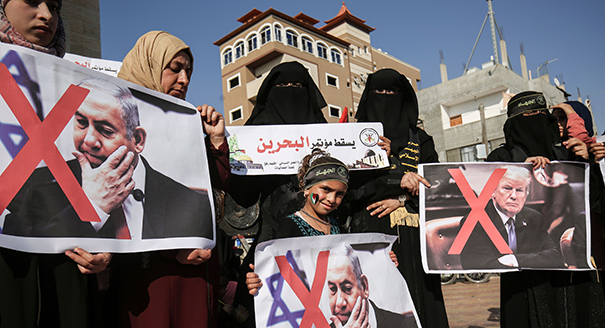“Peace to Prosperity” is the ambitious title that the White House has given to its “economic plan” to facilitate peace between Palestinians and Israelis, prepared for a workshop in Bahrain starting June 25. The document, posted on June 22, has faced widespread rejection for the way it offers an economic vision but postpones the political issues at the core of the conflict. Such an approach strikes many people as unrealistic and others as noxious—and many of them as both.
The response from the White House—that the political plan will come later—has been unpersuasive. It is also inaccurate. There is politics aplenty in the U.S. economic plan. The political vision is clearly articulated not merely through explicit statements but also by portentous silences, and it has domestic dimensions for the Palestinians, as well as broader regional dimensions.
The domestic dimension is to treat Palestinians as a collection of individuals living in the West Bank and Gaza with some nongovernmental, civil, and administrative institutions, but no national identity or leadership. This has been implicit in past statements by senior Trump administration officials. And it is now being hardwired into the economic program. There is simply no mention of the Palestine Liberation Organization, the Palestinian National Authority, or any of the structures accepted by Palestinians to speak in their name internationally. The U.S. ambassador to Israel has made this explicit: “I don’t know that the Palestinian Authority is the last word on how to create a better life for the Palestinians. The Palestinians themselves should have a say in that.”
The offer to give Palestinians “a say” is hardly a call for new elections. Indeed, the political vision of the economic plan focuses a great deal of attention on “governance,” but avoids democracy completely. There is reference to “the rule law” and “the legislative process,” but laws right now are being issued by decree by a Palestinian president, Mahmoud Abbas, whose name or office the White House’s plan dares not even mention. There are courts and even a reference to “the separation of powers” in the economic plan, but none to the Palestinian executive branch. Indeed, the White House vision acknowledges no traditional executive, legislative, or judicial branches of the Palestinian government, but only administrative bodies for service provision, local governments, and courts.
Moreover, these apparently headless institutions, operating outside of any constitutional, democratic, or governmental framework, are to be showered with enormous amounts of international assistance, according to the U.S. plan. Oversight is not to be accomplished through elections but by “civil society” and presumably by donors as well. The effect might be something like an international trusteeship over the Palestinian administration—though without any real trustee or termination date.
The assistance consists of imprecise and breathless pledges combined with some surprisingly specific proposals, such as having Arab states that have imported foreign universities—the United Arab Emirates and Qatar—export a new one to Palestine. Both the vague generalities and the fine print of specific plans betray a total blindness to the political obstacles that have hampered past efforts to support Palestinian governance, administration, courts, education and other public services, and civil society. Actually the blindness is not simply to the obstacles. The White House’s economic plan is blind to the very existence of any past efforts, some of which are a quarter of a century old and some even older.
The regional political vision in the U.S. economic plan builds on the domestic one. Palestinians are not a nation but a collection of individuals living in the West Bank and Gaza who should be integrated into the surrounding Arab states in a manner that integrates Israel into the region as well. The idea is not simply to avoid mentioning the occupation, but to make Palestinians profit from their acceptance into regional arrangements.
Trump administration officials, led by the president’s son in law Jared Kushner, seem to suggest that the lessons of history are unhelpful—history is full of failed ideas. What is ironic, therefore, is how much the new ideas resemble older ones, in different form. The economic plan amounts to the late Israeli prime minister Shimon Peres’ vision of a “New Middle East,” except that it is based not on resolving the Israeli-Palestinian conflict but defining it out of existence.
For instance, there is tremendous focus on creating physical infrastructure to support economic development—but now with a twist. Palestinians are not to have airports and ports—as international assistance supported during the height of the Oslo process. Instead, they are to rely on their neighbors, who will receive help: “From the improvement of neighboring countries’ airports and seaports to the development of a regional natural gas trading hub in Egypt, this project will improve mobility in the region and unlock new trade opportunities for the Palestinian private sector.” The passage between the West Bank and Gaza that allows Palestinian mobility—to which Israeli and Palestinian leaders had agreed when Kushner was barely a teenager—comes back, but this time not to ensure Palestinian unity so much as to dissolve Palestinians into the region.
In short, the U.S. economic plan is based not so much on postponing the political issues but on assuming that these issues are the invention of Palestinian leaders who have blocked their people’s prosperity. The plan’s excited prose cannot obscure the fact that with respect to the Palestinians—their leaders, identity, and fate—as well as to the West Bank and Gaza, there is nothing in the plan incongruent with former prime minister Menachem Begin’s views on a Palestinian entity, which he first presented to president Jimmy Carter in 1977.
Perhaps, then, the most novel idea in the U.S. approach is that the Trump administration is asking Arab states to pay for its realization.




